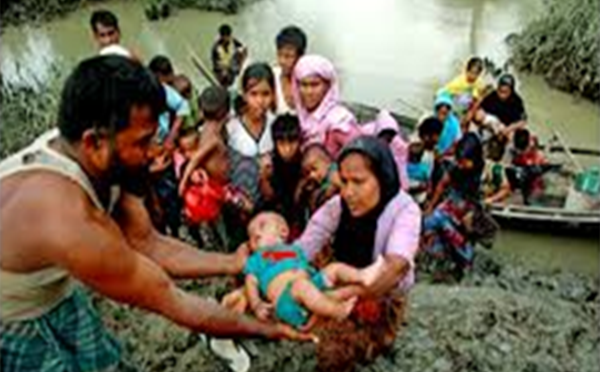People without Identity
Posted on : December 2, 2019Author : AGA Admin

2019 marks the second anniversary of the persecution of Rohingyas from Myanmar, and their subsequent refuge and settlement in Bangladesh’s coastal city of Cox Bazar, one of the poorest regions in the country. Two years later, the situation for the stateless community, originally from the Rakhine state in Myanmar has seen no improvement, but rather a state of continuing confusion and hopelessness. The Rohingya crisis has also starkly displayed the failure of the international community at the state, regional and global levels– of individual states of Myanmar, Bangladesh and India, the Association of South-East Asian Nations (ASEAN) and the United Nations respectively. Suspended between regional and global politics, are thousands of Rohingyas, both in Myanmar and Bangladesh who see no hope for their future because of their ethnic identity.
While Bangladesh, under the leadership of Sheikh Hasina allowed the Rohingyasto enter Bangladesh,they faced a second layer of non-recognition in the new land as the Bangladeshi government identify them officially as “Forcibly Displaced Myanmar Nationals” and not as “refugees”. Bangladesh is not a signatory to the Convention Relating to the Status of Refugees (1951), Convention Relating to the Status of Stateless Persons (1954), or the Convention on the Reduction of Statelessness (1961) or any of their subsequent protocols and as a result has no obligation to recognise the Rohingyas as refugees and extends protection to them only as it deems fits, under its own national laws. However, it is also true that Bangladesh has had a long history of giving refuge to displaced Rohingyas from the late 1970s to the 1990s, most of whom have stayed back without repatriation. After the 2016 sectarian violence, the influx of over 700,000 refugees added huge pressure to the already bleak conditions of the refugee areas around Cox Bazar.
Although the Hasina government has been sympathetic to the plight of the victims, the nation is seriously under-resourced and unable to support the Rohingyas, without international aid and support in the face of the lack of agreement of repatriation with the Myanmar government. Although there have been a few formal engagements about repatriation with Myanmar, the overwhelming majority of Rohingyas are uncomfortable about returning to their homeland in the absence of any concrete promise of protection against future violence by the Myanmar government. The state government of Rakhine has also extended no support to the displaced population against vigilante mobs and military forces who have injured, killed and raped countless Rohingya men and women. To contain the refugees, the Hasina government has resorted to build fences along the Rohingya camps and to patrol their perimeters, along with cutting internet access and cell phone coverage for the ‘protection’ of the refugees from illicit drug trade, arms business and human trafficking, that are also seen as national threats.
The Rohingya crisis has been unique with respect to the Myanmar government’s persistent effort to not recognise or even accept back its own citizens, even in the face of global criticism and sanctions from the U.S. The government of Myanmar still maintains the 2016 crisis was aimed towards persecuting “terrorists”. Excluded from the Union Citizenship Act, the Rohingyas have been on the receiving end on intense military crackdown from the 1970s. International pressure does not seem to have had significant effect. Rather, over time the Rohingya issue has been met with an ever-growing ambivalence, as is typical of most humanitarian issues across the world.
According to an ASEAN report, most members are optimistic about the return of the Rohingyas, and expect a “smooth and orderly” repatriation. Out of all ASEAN states, of which Myanmar is a part; only Malaysia and Indonesia, with Muslim majority countries have called for a ‘proactive approach’ to the issue while the rest of the members have only offered ‘weak criticisms’ of Myanmar’s handling of the situation and have refrained from direct accusations. ASEAN was heavily criticised by human rights groups for not even recognising the identities of the Rohingya victims, but instead calling them ‘Bengalis’. Another major player in this dynamic is the United Nations itself, which has been criticised by the Human Rights Watch forits 2019 report on UN Action in the refugee camps. It was evident from the report that while there were detailed descriptions of the history of the massacre and the Rohingya crisis not enough attention was paid to details of the planned actions.
The Rohingya crisis shows a concerted failure at the national and international levels of any resolute action about a case of extreme disregard for human life. For the Rohingyas, repatriationdoes not seem to be on the agenda any time soon.Alternatives like relocating to desolate flood prone islands like Bhashan Char is being considered by many as a substitute for overcrowded camps on borders. What is more distressing is the fact that recent UN Reports note that the Rohingya remaining in Rakhine face serious risks of genocide.
While the recent ruling by the International Criminal Court authorising investigations into allegations of crimes against humanity that forced the Rohingya to flee Myanmar has been seen as a significant development, it can only be hoped that justice and accountability will bring the continuing cycle of violence and abuse to an end.
Shromona Jana
Intern AGA





Leave a Reply